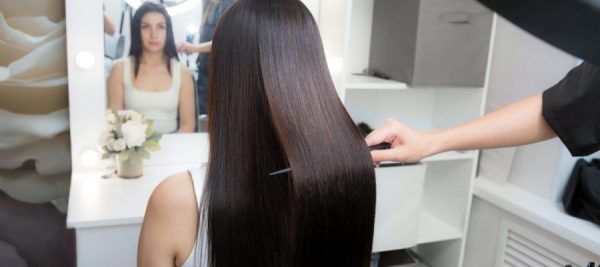Protein hair treatments
Protein hair treatment are cosmetic products designed to strengthen and repair damaged hair. Hair is made up of 95% protein, and unfortunately, everything we do to our hair, even washing and brushing, causes changes to the protein composition, so you can imagine what happens when there are chemical processes, coloring, bleach, and heat damage involved. The more you protect your hair with protein replenishment the more you will help prevent damage from advancing. Protein treatments aim to replenish and restore the protein structure of the hair, improving its strength, elasticity, and overall health.
Different Protein Treatment
protein Reconstructors: Hydrolyzed proteins are used in the formulation of these treatments to permeate the hair shaft and repair its structure. They are advised for badly damaged hair since they are more effective.
Treatments with Keratin: Keratin treatments, frequently carried out in salons, entail putting a keratin solution on the hair and heating it to a seal. This lessens frizz and smoothes the hair cuticle.
Protein Conditioners: These are standard conditioners enhanced with extra proteins, such as silk, collagen, or keratin. They can be applied more regularly and are gentler than other protein therapies.
Protein Covers: These are treatments for deep conditioning that contain more proteins. Usually, they are utilized once a week or as required to offer a more thorough restoration for harm.
Protein Packs: These are concentrated treatments that target strengthening and restoring hair, much like protein masks. They are frequently applied to more serious harm.
Frequently Asked Questions on Protein Hair Treatment
1. Can I Use Protein Treatments if I Have Allergies or Sensitive Skin?
Before using any new hair product, it is imperative to verify the contents for potential allergens and perform a patch test, particularly if you have sensitive skin or allergies.
2. Are there Natural Alternatives to Commercial Protein Treatments?
Yes, you can make at-home protein treatments using natural items like eggs, yogurt, and avocado. These ingredients also contain proteins. They might, however, differ in their efficacy
3. Can Protein Treatments Straighten Curly Hair or Eliminate Frizz?
While protein treatments can improve the overall health of the hair and reduce frizz, they are not designed to permanently straighten hair. Keratin treatments, on the other hand, are known for their smoothing effects.
3. What is a Protein Hair Treatment, and why is it Necessary?
A protein hair treatment is a cosmetic product that replaces lost proteins in damaged hair to strengthen and mend it. The health and integrity of the hair must be preserved, particularly if it has experienced heat styling, chemical treatments, or environmental damage.
4. How often Should I use a Protein Treatment?
The state of your hair determines how frequently you should have protein treatments. More regular use of mild treatments, such as protein-conditioning products, can be suggested once a week; more rigorous treatments should only be offered once a month or as needed.
5. Are there Different Types of Protein Treatments?
yes, there are many different kinds of protein treatments available, including reconstructors, masks, packs, conditioners, and keratin treatments. The ingredients and intensity of each variety differ.
6. How do I Choose the right Protein Treatment for my Hair Type?
Take into account the particular needs and state of your hair. A keratin treatment or protein reconstructor may be necessary for more severe damage. Trichologist or hairstylist consultations can yield a customized suggestion
7. Can I use Protein Treatments on Color-Treated or Chemically Processed Hair?
A lot of protein treatments are safe for hair that has undergone chemical or color processing. But it’s crucial to read product labels and select treatments made especially for certain kinds of hair.


Leave a Reply